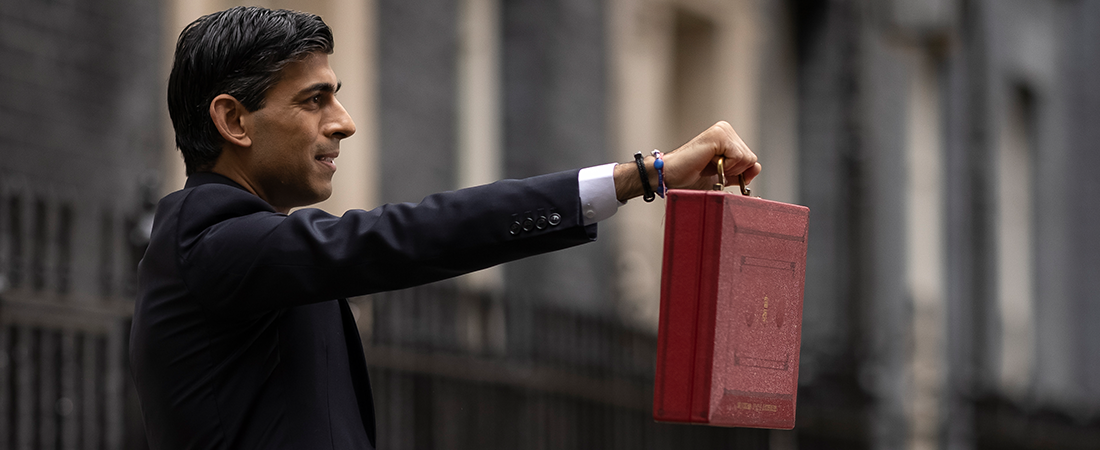While Rishi Sunak and Boris Johnson may differ both politically and personally, in his Budget and Spending Review today the Chancellor very much adopted his next-door neighbour’s risk-taking philosophy. In his third Budget as Chancellor, Rishi Sunak decided to splash the cash – gambling that optimistic growth forecasts for the future would fund large amounts of public spending. To cheers of delight in the Commons chamber today, the Chancellor ended the public sector pay freeze, raised the minimum wage, cut the Universal Credit taper rate and made significant investments in infrastructure. There were also major reforms to simplify the alcohol duty system, reforms to business rates and a 50% discount for retail and hospitality.
High finance, low politics
All Budgets are political, but this was the most political for some time. It was laser-focused on the new Tory voters that the party needs to retain at the next election. Sunak targeted dollops of cash at the sort of places in the North and Midlands which returned Tory MPs for the first time in 2019, and where voters tend to favour higher spending and to demand tangible benefits in return for their support next time.
It’s the economy stupid
The forecast for the UK economy has been upgraded significantly, increasing the Chancellor’s room for manoeuvre. The Treasury has chosen to spend a lot of this windfall, increasing departmental spending by £150bn. The Chancellor has predicted a “new age of optimism,” but there remain reasons to be concerned that the outlook may not be so bright – not least with the threat of inflation combined with a crisis in the cost of living and ongoing supply shortages.
One fiscal rule to rule them all
Cynics might say the Chancellor did not neglect his own political ambitions, as well as his party’s. In closing his speech Sunak emphasised that in his chest still beats the heart of a committed tax-cutter – sure to go down well with Tory grassroots and on the backbenches. He also committed to balancing the books for day to day spending by the end of the Parliament in 2024-25. Yet this new rule, while superficially constricting, leaves the Chancellor plenty of room to borrow to pay for new capital infrastructure. It is also the exact same rule announced by Shadow Chancellor, Rachel Reeves. After over a decade of significant divergence on economic policy, Labour and Conservatives now appear to be in lockstep.
That’s just capital
While you may think money is money, the Treasury does not. Within HMT, spending is split between “capital spending” that pays for infrastructure projects and “resource spending” which pays for people and programmes. In part because of the new fiscal rules, HMT has lots of capital to spend. That is why, if you look at the detail of many of the major announcements, they are all for big shiny new things – new transport projects, new CCTV and new hospitals. However, where the Chancellor is much more constrained is on resource spending. For mainly resource focused departments, such as Justice, HMRC and Local Government, it is likely they will not feel much better off. The increase in public sector pay will also need to be paid for from departmental budgets, putting further pressure on their resource allocations.
Do they know it’s Christmas time?
The unanswered question going into this Budget was how the Chancellor would manage the increasing cost of living. Part of his answer has been to significantly hike the National Living Wage to £9.50, a cost predominantly borne by businesses. His other responses in the one genuine Budget ‘rabbit’, has been to cut the ‘taper rate’ for Universal Credit. This lowers the effective marginal tax rate for those in work and on UC from 75% to 67%. These measures are clearly a huge benefit to some in work on low pay, but challenges remain. In a Portland poll conducted last week, 45% of the public said they were worried about a rise in interest rates – and it is not clear that anything the Chancellor said today will reassure them.
It’s (not) easy being green
What was notably in short supply in the Chancellor’s speech was any real mention of tackling the climate crisis, despite COP26 taking place next week. Indeed, some announcements, such as freezing fuel duty and lowering air passenger duty for domestic flights, are likely to lead to higher rather than lower carbon emissions. While there was some positive news, such as creating a new business rates relief for green investments, this pales in comparison to what is widely acknowledged is needed. The Treasury still clearly sees net zero as a problem for the future, with no clear answers on how to deliver the investment needed at a time of already growing pressures on household budgets.
Labour Lost
Responding to the Budget statement is infamously the hardest gig in the House of Commons, so Keir Starmer could be forgiven if he felt some relief when a positive Covid test meant he had to pass the job on to Shadow Chancellor Rachel Reeves. She will have done her own future leadership hopes no harm at all by making a decent fist of it. But Labour are hamstrung. Huge amounts of extra public spending is already flowing out of the Treasury and there is a limit to how much spending voters believe is affordable without dramatic tax rises.
How it’s going down so far
Immediate coverage in key places like the BBC and Daily Mail mobile apps was warm, focused on extra spending and eye-catching measures like the reforms to alcohol duties which will cut the price of most beers. Even the august FT was warm-to-neutral, its website leading on the Chancellor’s “moral mission to limit state and cut taxes”. Key figures in Number 10 and the Treasury will be delighted – whether they remain so will depend on what journalists and economists can learn through pouring over the Red Book in the coming hours and days.

